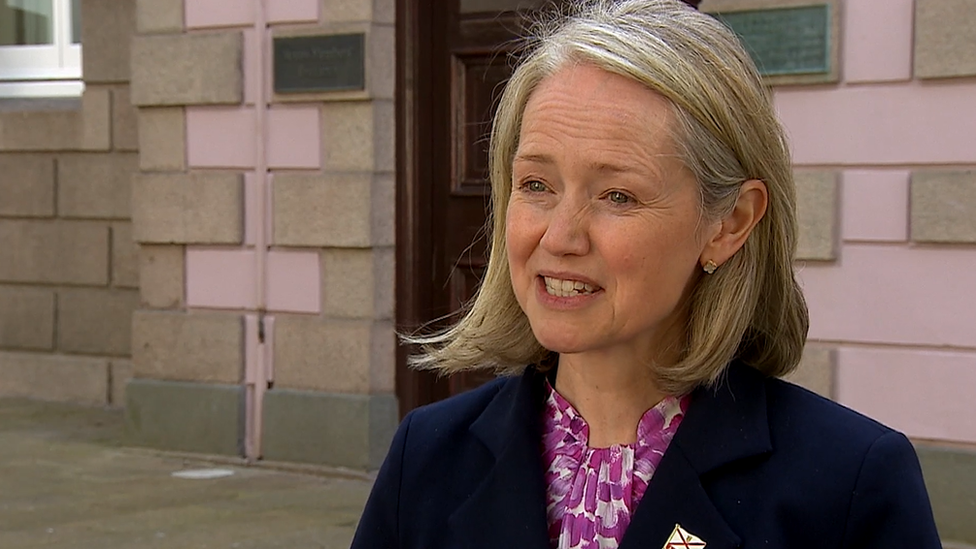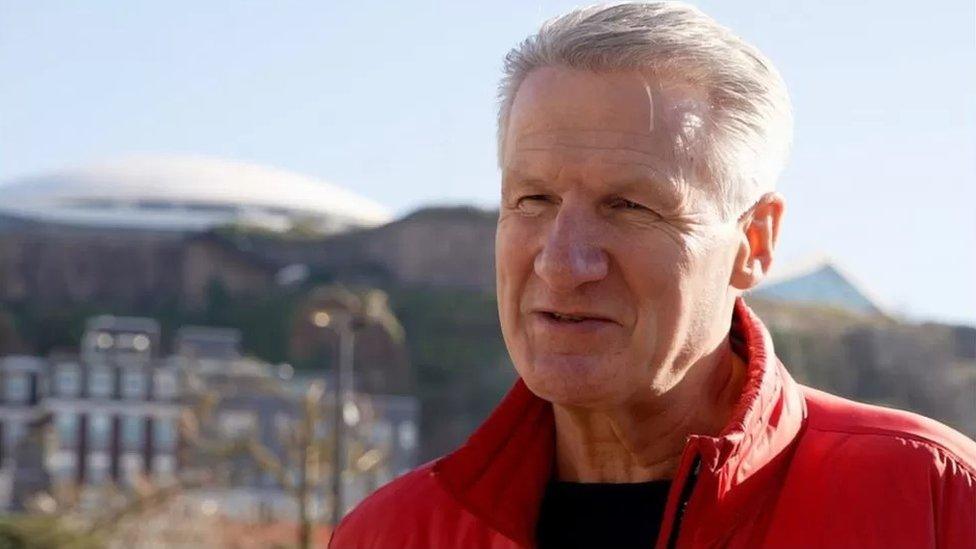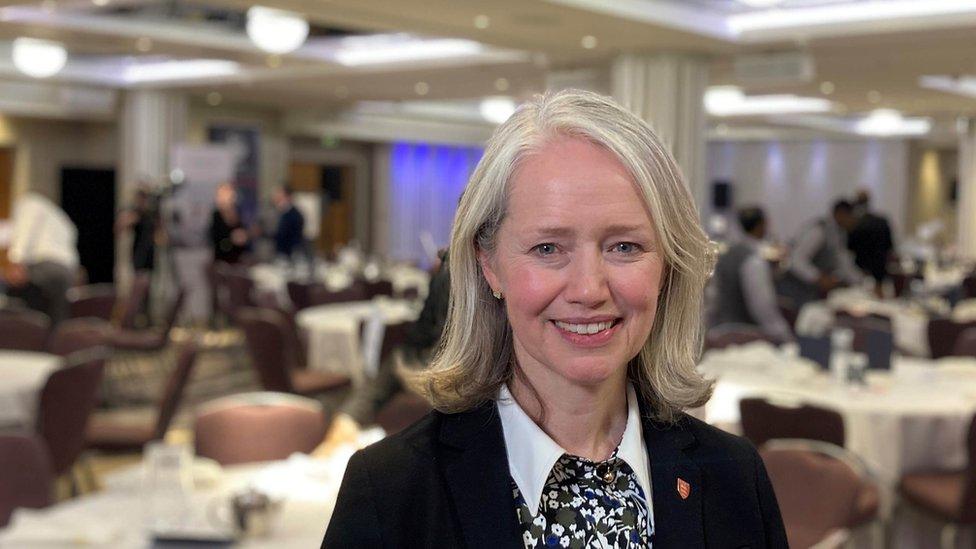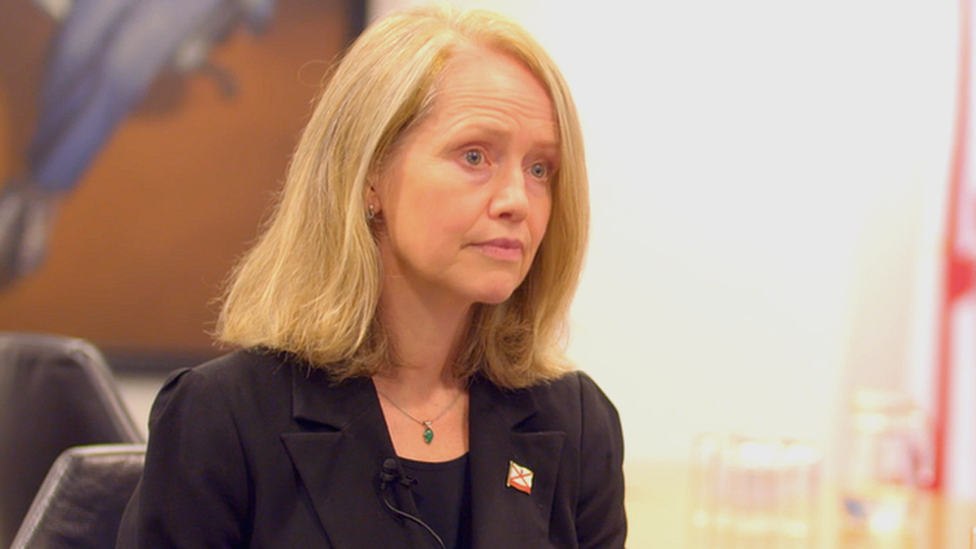Jersey's chief minister vote of no confidence explained
- Published

Jersey's 49 politicians will have to decide whether or not Kristina Moore stays as Chief Minister
Jersey's chief minister is facing a vote of no confidence in the States Assembly on Tuesday 16 January.
Deputy Tom Binet, who has brought the motion forward, said a change of leadership was needed.
But what does that mean? What is the process for a confidence vote? And what might be the outcome?
What are States members being asked to decide?
Jersey's 49 politicians have a decision to make which, on the surface at least, might appear fairly straightforward.
Do they have believe that Deputy Kristina Moore should be Jersey's Chief Minister, or not?
Unless they opt to abstain - in other words, to sit on the fence and refuse to pick a side - States members face a binary choice when it comes to the final vote.
Due to the wording of the proposition, external - 'The States are asked to decide whether they are of opinion that they have no confidence in the Chief Minister' - those in favour of unseating Ms Moore will vote 'pour'.
Those who wish her to retain her position will vote 'contre'.
But while their voting options are clear and simple, for many of them, deciding which button to push when the vote opens will be more complicated.
It is fair to say that most of Jersey's politicians - including those in government - have disagreed with some of the decisions Ms Moore has made during her time in office.
But do they disagree to such a degree that they feel she ought to be replaced as the island's political leader?
For some, the answer will be yes. For others, it will be no.
And while many have already decided which way they intend to vote, a few States members may wait until the very last moment - until they have heard the thoughts of their colleagues - before making their minds up.

Deputy Tom Binet, who has brought the motion forward, said a change of leadership was needed
How will the debate work?
The vote will be first item of public business on this week's States Assembly order paper.
Usually, public business starts at around 14:15 GMT, following question-time which takes place between 09:30 and 12:45.
But it is possible once the sitting gets underway for any member of the States to ask for the debate to be taken before question-time, subject to the approval of a majority of their colleagues.
Once the debate starts, Mr Binet will speak first.
After he has told politicians why he believes the chief minister ought to lose her job, Ms Moore will be given a chance to respond.
The 47 other elected members of the States Assembly will all then be given an opportunity to have their say, so the debate could last a fairly long time.
Once everybody who wants to has spoken, there will be two closing speeches: Ms Moore will again tell her colleagues why she feels she is the best person to the lead the island, before Mr Binet sums up, and calls for the vote.
The results will be known immediately.
What happens if the vote of no confidence is rejected?
This situation will arise if more States Members vote 'contre' than 'pour'.
It will mean Ms Moore keeps her job.
With her position secured, the chief minister will recommend Deputy Steve Ahier as her new infrastructure minister, to replace Mr Binet.
The Assembly will be asked to approve her selection, although they could also pick another candidate, if someone were to stand against Deputy Ahier and receive more votes.
What about if the vote of no confidence is approved?
If more States members vote 'pour' rather than 'contre', Jersey will be getting a new chief minister and a new government.
But it will not happen immediately, and Ms Moore will remain in her post until a new Council of Ministers has been selected.
Under States rules, a new political leader would need to be in place no later than seven clear working days following the vote of no confidence.
Any of the island's politicians could stand for the top job, provided they collect the signatures of six colleagues.
There would then be a specially convened States sitting, at which each of the candidates would make a speech and face questions from their fellow members.
Depending on the number of people seeking the role, there would be a series of votes, until just two candidates remained.
The winner of the final vote would become the chief minister-designate.
That person would have two clear working days in which to put together their proposed new Council of Ministers.
There would then be another special sitting at which final decisions about who fills each ministerial role would rest with the States Assembly, which could choose to appoint someone other than the chief minister-designate's preferred pick.
Only once each new minister had been chosen would Ms Moore cease to be the island's political leader, and the new government would enter office.

Follow BBC Jersey on X (formerly Twitter), external and Facebook, external. Send your story ideas to channel.islands@bbc.co.uk, external.
- Published11 January 2024

- Published3 January 2024
- Published31 December 2023

- Published26 November 2023